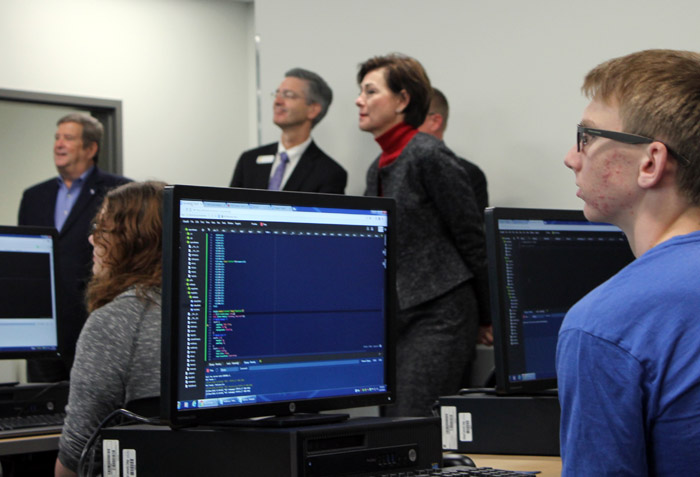
Lt. Gov. Kim Reynolds visited with students and education leaders from the Corridor during a Nov. 15 tour of the Kirkwood Regional Center at the University of Iowa. Ms. Reynolds said the governor’s office is drafting legislation that would expand computer science offerings at Iowa high schools. PHOTO CHASE CASTLE
By Chase Castle
chase@corridorbusiness.com
The governor’s office plans to renew its push to expand computer science education next year, which will likely include another attempt to require Iowa high schools to offer at least one computer science course.
Speaking to local education leaders at the Kirkwood Regional Center at the University of Iowa, Lt. Gov. Kim Reynolds said she’d also like state lawmakers to consider allowing more computer science courses to fulfill math credits for high school students.
“We are looking for ways that we could get every single school district to offer at least one computer science class,” Ms. Reynolds said. “We’d love, of course, for them to do more than that.”
Speaking with Kirkwood President Mick Starcevich, University of Iowa Provost P. Barry Butler and others, Ms. Reynolds said the governor’s office plans to reintroduce legislation next year meant to establish provision requirements and course standards. The proposal will likely focus on high school students, she said, but may apply to lower grade levels as well.
Ms. Reynolds’ comments at the Nov. 15 meeting follow efforts by Gov. Terry Branstad earlier this year to get lawmakers to approve Iowa HF 2324. That proposal sought to establish a computer science advisory council that would have made recommendations on computer science standards, which would in turn shape the implementation of “high-quality” computer science courses statewide by fall 2018.
The proposal was overwhelmingly approved by the Republican-led House, but stalled in the Senate – a chamber that will be under Republican control when the new session begins next month.
Linda Fandel, special assistant for education in the governor’s office, said the new legislation is being developed in coordination with the Department of Education in the hopes of introducing the proposal in January.
She noted the legislation will likely focus on broad computer science or programming skills, as opposed to using specific types of software, which can quickly become outdated.
“We’re not likely to advocate for one particular program, but a standard that will really enable students to have the foundation in computer science they need, both in school and in their life and careers going forward,” Ms. Fandel said. “It’s becoming a fundamental skill to know how computers work.”
Next year’s proposal will likely borrow from the framework established in Arkansas, which last year became the first state in the nation to require computer science courses at all public schools. Other states such as Rhode Island, Virginia and Washington are enacting similar policies.
“There are a lot of great examples to learn from, so we’ve spent a lot of time visiting with those experts,” she said.
The details of the revised proposal are still being worked out, but Ms. Fandel reiterated that the requirement for accredited high schools in Iowa to offer a substantial computer science course will likely remain. Presently, about 230 of the state’s 333 school districts offer some form of computer science curricula, but the content of those courses varies greatly.
She said the new proposal is likely to more explicitly address the term “high quality” in terms of course standards – a definition that was absent from the last session’s bill.
Professionals with math and computer science expertise are projected to be among the most in-demand in Iowa over the next decade, tied with health care support occupations.
According to the state labor data, the number of jobs in Iowa within the computer science and math fields is projected to increase to 39,630 by the year 2024. The increase would add about 6,000 jobs to the state’s 2014 employment levels in those fields, and would mark an annual growth rate of 1.8 percent – twice the average speed of all the state’s occupations combined.
“It’s just really essential in the state of Iowa for us to continue to grow and have these opportunities,” Ms. Reynolds said. “The need is there.”
She said programs like those offered at the Kirkwood Regional Center could become a model for the integration of high school, professional and post-secondary education within the computer science fields.
As a collaboration between Kirkwood Community College, the University of Iowa, the Grant Wood Area Education Center and multiple Iowa City-area school districts, the $32 million Kirkwood Regional Center opened last year, and offers hands-on technical programming that can be used for college credit at Kirkwood, elective credits and/or professional certification.
In cooperation with local school districts, students can also take art, tech and science courses that can be used for both high school and college credit through the center’s High School Academies. Among them is the Computer Software Development Academy, which offers courses in fields such as computer programming, business systems analysis and internet security.
About 425 high school students were enrolled in college-level courses or training programs at the center, including students from West, Elizabeth Tate, Solon and Tipton high schools.




